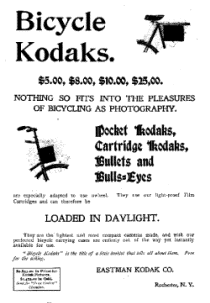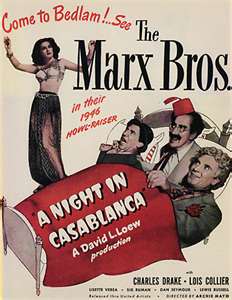Newsletter Issue 35 - January 2012
In this issue:
Stopping a Patent
Kodak - definition of a strong trademark
Marx Bros. and trademark law.
Walmart competition for new products
 Stopping
a Patent
Stopping
a Patent
Consider the following situation: you learn that your competitor has a pending U.S. patent application for a product that you make. Any resulting patent could be disastrous for your company. What can you do to stop or limit your competitor's patent application?
The PTO has proposed a new rule that would allow you to notify your competitor's patent examiner about prior art patents, published patent applications and other printed publications that may defeat your competitor's patent application. Most important, you can (and must) present argument to the examiner as to why each item of prior art is important to the application. The new rule will implement 35 U.S.C. 122(e), which is part of the 'America Invents Act.' This section of the Act will go into effect on September 16, 2012.
The PTO refers to prior art submitted under the rule as 'third-party preissuance submissions.' The 'third-party preissuance submissions' rule is a part of a larger effort in the Act to allow opportunities for persons to challenge patents outside of a courtroom.
Time limits apply. You must act before the examiner issues the first PTO office action rejecting a claim or allowing all claims. Where the PTO has acted very quickly on the application but has not yet allowed all pending claims, you have six months after the application is published by the PTO. Modest fees apply, but are waived if you cite three or fewer items of prior art.
Concerned about revealing your identity? The 'third-party preissuance submission' can be anonymous.
How will the new rule affect potential infringers and inventors? Wealthy potential infringers can choose to forego 'preissuance submissions' and hold back prior art for use in court later on. Potential infringers having more modest means may choose a 'preissuance submission' as a cost-effective way to limit eventual damage and to gain certainty. For the inventor, a 'preissuance submission' will be annoying, but will strengthen the patent by bringing relevant prior art to the examiner's attention earlier, reducing the need for a later reissuance or re-examination. A 'preissuance submission' also will alert the inventor to the presence of a worried competitor, which may indicate that the invention and hence the eventual patent are valuable and worthy of investment.
The proposed rules are open for public comment until March 5, 2012.
Cameras and Bicycles -- Say Cheeze!
Intellectual property lawyers are fond of pointing out that the
KODAK trademark has assumed almost iconic proportions as the epitome
of trademark fame and strength. One court noted that "The Kodak
trademark is perhaps one of the strongest and most distinctive
trademarks in this country, if not the world." Indeed, KODAK is
listed in the leading treatise of trademark law by J. Thomas
McCarthy as one of just a handful of fanciful -- hence strong --
marks joining ranks with the likes of CLOROX, EXXON, and POLAROID.
Did you realize that the fame of the KODAK mark has its roots in the
19th century?
In 1890, Eastman defended its KODAK brand before the Patents Court
of the United Kingdom in the case of Eastman Photographic Materials
Company, v. John Griffiths Cycle Corporation, Limited (15 RPC 105).
This was a period when steam was king, the automobile was in its
infancy, and wireless telegraphy was high-tech. Yet, the facts of
the case have a modern ring. Here's what happened:
For many years, Eastman had been using the registered trademark
"Kodak" to identify their goods, especially cameras. One of its
products was a specialty camera and attachment hardware for
bicyclists. The product was advertised by Eastman as "Bicycle Kodaks."
During the same period, Eastman Company owned shares in a limited
company called the "Kodak Company, Limited," which had yet to begin
business but showed commitment to its mark. In the previous year,
1897, the John Griffiths Cycle Corporation ("JG") applied for and
obtained registration of the word "Kodak" as a trademark identifying
bicycles and other vehicles. It also registered a new company called
"the Kodak Cycle Company, Limited" and commenced to advertise "Kodak
Cycles". Although Eastman's KODAK mark was registered it was not
registered to identify bicycles. Displeased with these developments,
Eastman sued JG and the Kodak Cycle Company demanding that they
refrain from carrying on business under the name Kodak Cycle
Company, passing off their goods as the goods of Eastman, and
infringing Eastman's trademarks.
The court held that KODAK had become identified with Eastman and its
goods, and that there was a close connection between the bicycle and
photographic trades. The court further held JG's registration had
been obtained by fraud, that the defendants were trying to get the
benefit of the reputation of the Eastman company, and that the
trademark must be "expunged" as being calculated to deceive.
Finally, of course, the court imposed an injunction on the
defendants to stop the infringing conduct.
So, if you didn't know that there is a close connection between
bicycles and cameras, now you do. Let's hope that the Eastman Kodak
Company can pull itself together and reclaim its lost grandeur.
A Tale of (More Than) Two Brothers
History, though sometimes a dry and dusty exercise, may occasionally teach important lessons in trademark law, and in common sense (a quality often found lacking in trademark attorneys). Case in point: the dispute between Warner Bros. movie studio and the Marx Brothers, over the film "A Night in Casablanca".
Our story opens in 1947. Groucho and his famous siblings are preparing to make "A Night in Casablanca". Wanting to generate publicity for the upcoming film, the Marx Brothers spread a story that Warner Bros. objected to the use of the term "Casablanca" through a few columnists. Someone at Warner Bros. took the bait, and wrote a letter to Groucho in typical lawyerly fashion. Groucho Marx chose to respond himself, rather than allowing his attorneys to speak for him (not a course that we at LWH usually recommend to our clients, none of whom are Groucho Marx.)*
Dear Warner Brothers:
Apparently there is more than one way of conquering a city and holding it as your own. For example, up to the time that we contemplated making this picture, I had no idea that the city of Casablanca belonged exclusively to Warner Brothers. However, it was only a few days after our announcement appeared that we received your long, ominous legal document warning us not to use the name Casablanca.
It seems that in 1471, Ferdinand Balboa Warner, your great-great-grandfather, while looking for a shortcut to the city of Burbank, had stumbled on the shores of Africa and, raising his alpenstock (which he later turned in for a hundred shares of the common), named it Casablanca.
I just don't understand your attitude. Even if you plan on re-releasing your picture, I am sure that the average movie fan could learn in time to distinguish between Ingrid Bergman and Harpo. I don't know whether I could, but I certainly would like to try.
You claim you own Casablanca and that no one else can use that name without your permission. What about "Warner Brothers"? Do you own that, too? You probably have the right to use the name Warner, but what about Brothers? Professionally, we were brothers long before you were. We were touring the sticks as The Marx Brothers when Vitaphone was still a gleam in the inventor's eye, and even before us there had been other brothers -- the Smith Brothers; the Brothers Karamazov; Dan Brothers, an outfielder with Detroit; and "Brother, Can You Spare a Dime?" (This was originally "Brothers, Can You Spare a Dime?" but this was spreading a dime pretty thin, so they threw out one brother, gave all the money to the other one and whittled it down to, "Brother, Can You Spare a Dime?")
Now Jack, how about you? Do you maintain that yours is an original name? Well, it's not. It was used long before you were born. Offhand, I can think of two Jacks -- there was Jack of "Jack and the Beanstalk," and Jack the Ripper, who cut quite a figure in his day.
As for you, Harry, you probably sign your checks, sure in the belief that you are the first Harry of all time and that all other Harrys are imposters. I can think of two Harrys that preceeded you. There was Lighthouse Harry of Revolutionary fame and a Harry Appelbaum who lived on the corner of 93rd Street and Lexington Avenue. Unfortunately, Appelbaum wasn't too well known. The last I heard of him, he was selling neckties at Weber and Heilbroner.
Now about the Burbank studio. I believe this is what you brothers call your place. Old man Burbank is gone. Perhaps you remember him. He was a great man in a garden. His wife often said Luther had ten green thumbs. What a witty woman she must have been! Burbank was the wizard who crossed all those fruits and vegetables until he had the poor plants in such a confused and jittery condition that they could never decide whether to enter the dining room on the meat platter or the dessert dish.
This is pure conjecture, of course, but who knows -- perhaps Burbank's survivors aren't too happy with the fact that a plant that grinds out pictures on a quota settled in their town, appropriated Burbank's name and uses it as a front for their films. It is even possible that the Burbank family is prouder of the potato produced by the old man than they are of the fact that from your studio emerged "Casablanca" or even "Gold Diggers of 1931."
This all seems to add up to a pretty bitter tirade, but I assure you it's not meant to. I love Warners. Some of my best friends are Warner Brothers. It is even possible that I am doing you an injustice and that you, yourselves, know nothing at all about this dog-in-the-Wanger attitude. It wouldn't surprise me at all to discover that the heads of your legal department are unaware of this absurd dispute, for I am acquainted with many of them and they are fine fellows with curly black hair, double-breasted suits and a love of their fellow man that out-Saroyans Saroyan.
I have a hunch that this attempt to prevent us from using the title is the brainchild of some ferret-faced shyster, serving a brief apprenticeship in your legal department. I know the type well -- hot out of law school, hungry for success and too ambitious to follow the natural laws of promotion. This bar sinister probably needled your attorneys, most of whom are fine fellows with curly black hair, double-breasted suits, etc., into attempting to enjoin us. Well, he won't get away with it! We'll fight him to the highest court! No pasty-faced legal adventurer is going to cause bad blood between the Warners and the Marxes. We are all brothers under the skin and we'll remain friends till the last reel of "A Night in Casablanca" goes tumbling over the spool.
Sincerely,
Groucho Marx
Not satisfied, the Warner's attorneys requested a plot summary of the upcoming film from Groucho, who obliged...
Dear Warners:
There isn't much I can tell you about the story. In it I play a Doctor of Divinity who ministers to the natives and, as a sideline, hawks can openers and pea jackets to the savages along the Gold Coast of Africa.
When I first meet Chico, he is working in a saloon, selling sponges to barflies who are unable to carry their liquor. Harpo is an Arabian caddie who lives in a small Grecian urn on the outskirts of the city.
As the picture opens, Porridge, a mealy-mouthed native girl, is sharpening some arrows for the hunt. Paul Hangover, our hero, is constantly lighting two cigarettes simultaneously. He apparently is unaware of the cigarette shortage.
There are many scenes of splendor and fierce antagonisms, and Color, an Abyssinian messenger boy, runs Riot. Riot, in case you have never been there, is a small night club on the edge of town.
There's a lot more I could tell you, but I don't want to spoil it for you. All of this has been okayed by the Hays Office, Good Housekeeping and the survivors of the Haymarket Riots; and if the times are ripe, this picture can be the opening gun in a new worldwide disaster.
Cordially,
Groucho Marx
It seems that this confused the attorneys even more, so they again wrote, asking for more details. Grouch again responded...
Dear Brothers:
Since I last wrote you, I regret to say there have been some changes in the plot of our new picture, "A Night in Casablanca." In the new version I play Bordello, the sweetheart of Humphrey Bogart. Harpo and Chico are itinerant rug peddlers who are weary of laying rugs and enter a monastery just for a lark. This is a good joke on them, as there hasn't been a lark in the place for fifteen years.
Across from this monastery, hard by a jetty, is a waterfront hotel, chockfull of apple-cheeked damsels, most of whom have been barred by the Hays Office for soliciting. In the fifth reel, Gladstone makes a speech that sets the House of Commons in a uproar and the King promptly asks for his resignation. Harpo marries a hotel detective; Chico operates an ostrich farm. Humphrey Bogart's girl, Bordello, spends her last years in a Bacall house.
This, as you can see, is a very skimpy outline. The only thing that can save us from extinction is a continuation of the film shortage.
Fondly,
Groucho Marx
According to the story, the attorneys never again wrote to Groucho, there was no law suit, the movie was made (and in our opinion, it was not one of their best) and Groucho wrote to a friend, "At any rate, the publicity has been wonderful on it, and it was a happy idea. I wish that they would sue, but as it is, we've had reams in the paper."
In a strangely ironic twist, Warner Bros. now owns the distribution rights to "A Night in Casablanca". There is also no truth to the rumor that Groucho met a dispossessed and long-lost brother of Jack Warner named Louis Warner on a transatlantic crossing in 1938, and told him, "Louis, I think that this is the beginning of a beautiful friendship."
* The letters were donated by Groucho Marx to the Library of Congress, and reprinted in his 1967 book, "The Groucho Letters".
Walmart Sponsors New Product Competition
Walmart Labs is Walmart's effort to use social media to compete with Amazon. Walmart Labs currently is sponsoring a 'get on the shelf' competition to identify new products for sale through Walmart.com and its brick-and-mortar stores. The contest rules require that applicants submit an entry form and a link to a YouTube video of the product. After the entries are vetted by Walmart, links to the YouTube videos will be placed on the 'get on the shelf' website and visitors will vote for the best products. The three top vote getters will meet the Walmart product development team and receive an opportunity to sell their rights in the product to Walmart. If negotiations are not successful, the top vote getters will receive cash prizes.
If you are tempted to enter, remember that publication of the
YouTube video likely will terminate your foreign patent rights
unless you already have a pending patent application. The
competition closes to new entries on February 22, 2012 and winners
will be announced in late April.

